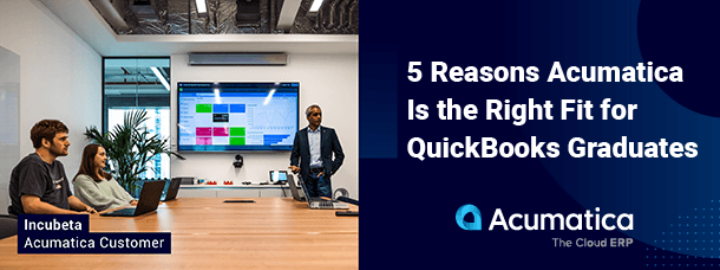
Graduation is a pivotal moment in life — the exclamation point at the end of a long, successful journey of learning and growth. It’s also a sign that you’re ready for the next, exciting chapter of your life.
As in life, businesses experience a similar cycle of growth.
Many individuals or entrepreneurs start out with a simple idea that soon emerges into an actual business requiring basic tools that will help get the business on its feet. For standard business technology, many of these new small and midsized businesses (SMBs) turn to QuickBooks.
QuickBooks is a straight-forward, entry-level business system that small organizations use to manage their basic accounting and core financial needs, eliminating paper-based processes, integrating reports, and simplifying payroll and tax requirements from the get-go. But there comes a time—as businesses grow in size and complexity—when QuickBooks isn’t enough.
In the first blog of this series, we discuss the five clear signs that you’re ready to graduate from QuickBooks, and in the second blog, we provide five reasons that Acumatica is the right fit for QuickBooks graduates. Today, we’ll address the five top pain points you’re likely experiencing if you’re still relying on QuickBooks—and why a transition to a modern, innovative ERP system developed with small and mid-sized businesses (SMBs) in mind is essential to your future growth and success.
Top 5 Pain Points for QuickBooks Users
1. Limited Capabilities
As an initial accounting package, QuickBooks is sufficient, with many users citing ease of use, efficiency, affordability, and time savings as benefits. But there are many who also call out QuickBooks’ limited capabilities. One example is its inability to fully accommodate businesses with a growing labor force, especially when this growth involves international expansion and managing multiple business entities.
QuickBooks Online offers different plans to fit different needs, but unfortunately, they also limit the number of users. For growing companies, having a set user amount will seriously stifle your forward momentum.
When you reach your user limits, your options are limited to upgrading your plan or purchasing additional licenses. Should neither of these options be feasible, you may turn to tried-and-true workarounds, such as sharing login credentials (a security and data integrity no-no) and manually gathering and inputting data (plus resorting to reporting on the business via Excel).
Unfortunately, such workarounds are inefficient, leading to reduced productivity and increased errors.
2. Ongoing and Unpredictable Costs
Though affordability is a common QuickBooks selling point, many long-time users find that the standalone accounting solution quickly becomes expensive. For example, the aforementioned limited capabilities often force businesses like yours to add on costly third-party applications—that may require time-consuming and pricey custom integrations—to manage expanding payroll, inventory management, and CRM requirements. Additionally, keeping these additional applications synched through QuickBooks upgrades adds a significant burden to small businesses operating without critical IT support.
But that’s not all.
Basic accounting software’s lack of industry-specific features forces you to implement additional software to accommodate your unique needs. It also requires you to rely on manual processes to get the job done. QuickBooks’ inability to scale with your growing business puts additional strain on your finances.
Now, add in the fact if you’re a QuickBooks Desktop user, you may have hardware maintenance costs, manual upgrades, and the need for customization. Your affordable accounting solution is not so affordable anymore.
3. Greater Complexities
From requiring new tools and additional employees to managing more data and connecting a network of technologies, a growing business will inevitably become a more complex business. With QuickBooks, these complexities are amplified by its limitations.
These constraints include:
- Manual workarounds (including using error-prone spreadsheets to connect data from separate applications or instances of QuickBooks for multiple entities within the business)
- Delayed order and inventory fulfillment
- Endless budget cycles
- Inefficient workflows and processes
- A lack of industry-specific capabilities
These real constraints eat up time, slow processes, waste resources and limit your organization’s potential.
4. Disconnected Data
We know that SMBs fuel the US economy, but what fuels SMBs? The argument could be made that data is the fuel for a growing business. For informed and strategic business decision making that empower business growth, you must have instant access to updated and accurate data, and you must have the ability to gather, store, and analyze that data.
Unfortunately, QuickBooks—as a standalone application with limited features—doesn’t provide this centralized database and often requires integration with additional applications. Because these applications do not always play well together, data gets caught in each application and requires expensive and time-consuming manpower to mine it as well as to consolidate the data into a single, comprehensive report.
This separation of data is known as “data siloes,” and this siloed information curbs your ability to glean real-time insights and to make swift, informed decisions.
5. Operational Inefficiency
According to an Indeed article, operational efficiency is “a term that describes a business’s ability to reduce inputs while producing the same number of outputs.” Author Jason Harper explains that costs, employees, and time are the required inputs and revenue, market differentiation, and customer acquisition and retention are the outputs. Together, they directly impact a company’s ability to become profitable.
Unfortunately, the pain points listed above prevent QuickBooks users from managing their operations effectively. The costs associated with adding on diverse, expensive applications, relying on manual interventions, and compiling reports using multiple data sources combined with the number of employees as well as the time required to manage these costly tasks effectively torpedoes efficiency.
One way you can improve operational efficiency is to leverage technology and digital transformation. Harper writes that it “can help you streamline operations, improve communication and automate routine tasks.” He’s right, and a modern enterprise resource planning solution (ERP), like Acumatica, is a smart choice.
Acumatica enables customers to spend:
- 90% less time gathering data.
- 80% less time completing quarterly statements.
- 40% less time processing shipping.
Acumatica customers also report closing their books in 5 days (compared to 15 days) and saving an impressive 7 hours per day on invoicing while also processing the same number of orders with 5 fewer people.
Make the QuickBooks Transition to Acumatica Your Top Priority
Graduating from QuickBooks to Acumatica’s comprehensive, cloud-native ERP solution should be a priority for growing SMBs.
Unlike QuickBooks, Acumatica provides a single, end-to-end, and flexible solution with integrated CRM, Financial Management, Service Management (and more) applications. It also delivers multi-tenant and intercompany accounting, tax management, payroll management, global accounting, and multicurrency capabilities along with robust real-time reporting that scales with your business.
Operational data from every department is funneled into a centralized database, which acts as a single source of truth for you and your team. Acumatica’s vital remote capabilities (including the native mobile app) enable employees to access critical business information from wherever they are, whenever they need. And Acumatica’s expert business partners will support you every step of the way, from implementation to go-live to after go-live.
Acumatica customer and QuickBooks graduate, Redmond, runs eight separate companies that offer a diverse mixture of services, including salt mining, fishing, and fencing. Each of these companies started out with QuickBooks, but they quickly found out that the system wasn’t sophisticated enough to manage their complex inventory, sales, customer tracking, warehouse operation, or project management needs.
The Redmond team had difficulty:
- Consolidating information, which led to creating spreadsheets requiring constant importing and exporting of information.
- Managing costs per projects and project profitability.
- Tracking changing inventory and how much cash was tied up in inventory.
- Trusting data that was being entered manually and was siloed.
- Getting timely information to manage AR, AP, inventory, and production schedules as well as to create required reports.
Redmond lost millions when customers couldn’t get their desired products and experienced crippling shortfalls and delayed projects. Additionally, Redmond’s growing transaction volumes caused QuickBooks to slow down, and even worse, caused the solution to crash their on-premises servers.
These challenges spurred Redmond on to find an affordable, flexible, and cloud-based ERP solution. After looking at their options, they chose Acumatica.
“[With Acumatica], we have current information needed to run and grow the businesses. That wasn’t always clear from QuickBooks,” Gabrielson says. “We have timely information for AP, AR, capital projects, inventory, forecasting orders, and production schedules. You can’t do any of that with QuickBooks. That’s one of the biggest competitive advantages we have with Acumatica.”
He adds, “We could have never grown the business sticking with QuickBooks. You can’t go to the CEO and say we can’t grow because our accounting system is limiting us. From a growth perspective, it’s a no-brainer to go with Acumatica.”
QuickBooks Graduates like Redmond experienced firsthand the pain points caused by relying on QuickBooks past its limited capabilities. Now, they’re benefitting from the transformative power of Acumatica.
If you’d like to hear more inspiring stories like this, stay tuned for our next post in the series.
 Canada (English)
Canada (English)
 Colombia
Colombia
 Caribbean and Puerto Rico
Caribbean and Puerto Rico
 Ecuador
Ecuador
 India
India
 Indonesia
Indonesia
 Ireland
Ireland
 Malaysia
Malaysia
 Mexico
Mexico
 Panama
Panama
 Peru
Peru
 Philippines
Philippines
 Singapore
Singapore
 South Africa
South Africa
 Sri Lanka
Sri Lanka
 Thailand
Thailand
 United Kingdom
United Kingdom
 United States
United States










